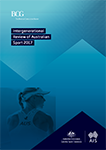EVIDENCE BASE FOR SPORT
THE VALUE AND BENEFITS OF SPORT
QUICK FACTS
There are numerous health, social, and economic benefits attributed to sport in Australia.1
Wellbeing 1
97% of Australians believe sport and physical activity are good for health and wellbeing.

Communities 1
88% of Australians believe sport is good for bringing their communities together.
Preventive health 2
- Sport plays an important role in helping Australians of all ages achieve the physical activity levels required to reduce the risk of developing a range of non-communicable diseases and illnesses.
Economic value 3
The combined economic, health and education benefits of sport return $7 for every $1 invested.
Wellbeing 2, 8
Sport – particularly team-based sport – can provide outcomes including:
- improved resilience
- improved mental health across the life course
- positive role models
- social connectedness
- higher likelihood of meeting physical activity guidelines and continuing physical activity long term.
Personal development 4, 5, 6
Young people who are members of a local sporting club are more likely to:
- demonstrate greater trust in other people
- possess a stronger sense of belonging to their community
- form more close friendships.
- achieve greater levels of life satisfaction, happiness and health
- possess a greater desire to give back to their community through volunteering.
Physical activity 7
Playing sport during childhood is critical for developing a life-long habit of being physically active. Children who grow up playing sport are 10% more likely to remain active as adults.
Learning 3
Children who play sport:
- have improved cognitive development
- are better at learning and retaining information
- and stay in school longer.
References +
- Community Perceptions Monitor Annual Report 2022-2023, Australian Sports Commission, (September 2023).
- Value of Sport: Preventive health, Clearinghouse for Sport, (accessed 11 May 2023).
- Intergenerational Review of Australian Sport, BCG Consulting for the Australian Sports Commission, (2017).
- The impact of sports participation on mental health and social outcomes in adults: a systematic review and the ‘Mental Health through Sport’ conceptual model, Narelle Eather, Levi Wade, Aurélie Pankowiak, Rochelle Eime, Systematic Reviews, Volume 12, article 102, (June 2023).
- Volunteers in Victoria: trends, challenges and opportunities, State of Victoria, Ministerial Council for Volunteers, (June 2017).
- In Sport, We Trust: how sport can bridge the UK trust deficit, SPORTED, (2019).
- Adolescent participation in sports and adult physical activity, Tuija Tammelin, Simo Näyhä, Andrew Hills, et al., American Journal of Preventive Medicine, Volume 24(1), pp.22-28, (2003) quoted in Intergenerational Review of Australian Sport, BCG Consulting for the Australian Sports Commission, (2017).
- Value of Sport: Social and mental wellbeing, Clearinghouse for Sport, (accessed 11 May 2023).
TOPICS
Discover the value and benefits of sport.
FEATURED REPORTS
Intergenerational Review of Australian Sport
BCG Consulting for the Australian Sports Commission, (2017)
Read the report
Sport in Western Australia: Social return on investment
Sport West, (2022)
(restricted access)

WHAT WE KNOW
EVIDENCE BASE FOR SPORT
Find information, research, and insights to support decision making in sport.WHAT WE NEED TO KNOW
NATIONAL SPORT RESEARCH AGENDA
Identifying priority areas of research for Australian sport.EXPLORE
Explore our extensive range of information resources relating to sport.

PUBLICATIONS
Search and access research and data from journals, databases, books, reports, surveys, and more.

RESEARCH DATA
Research data from the Australian Sports Commission's national sport and physical activity survey – AusPlay.

